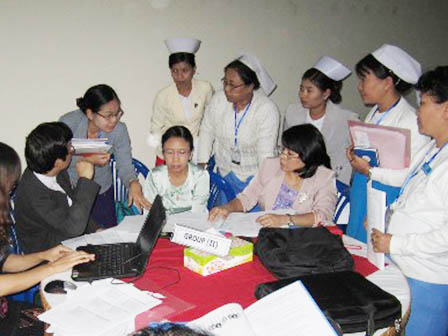A major step forward has been taken that will likely pave the way for the professionalizing of midwifery practice and setting National Midwifery Standards in Myanmar in the coming years. After two long days of deliberating, starting 22 December 2014, and almost 90 professionals from the Department of Medical Science, the Department of Health and the Myanmar Nurse and Midwife Council grappling over the 2013 ASEAN Guidelines for Skilled Birth Attendance, consensus has been reached and recommendations have been made for setting new standards for midwifery practice and skilled birth attendance in Myanmar. This is a significant milestone given that up till now midwifery has been considered a low grade entry point for nursing in Myanmar.
UNFPA was instrumental in supporting this event, as well as its precursor, the ASEAN regional event in 2013 in Myanmar that led to the ASEAN Regional Guidelines for Minimum Requirements for Training and Accreditation of Skilled Birth Attendants. Both these events involved the Department of Medical Science, Department of Health Planning, Department of Health, Principals of Midwifery Schools and Assistant Directors of Nursing from States and Regions across the country, Ob-Gyn and Paediatrics specialists from the teaching universities, members of the Myanmar Nurse and Midwife Association, Ob-Gyn Society of MMA and representatives from UNICEF and JPIEGO.
The Union Minister of Health, Dr. Than Aung in his opening address at the December 22-23 event, welcomed the updating of the curriculum of health professionals including midwives and said it was time for aligning the country’s midwifery practices with the ASEAN standard. He called for deliberate and candid discussions on the way forward for midwifery education, career advancement and regulation based on the country’s need.
The workshop focused on setting standards were being set for competency based midwifery education in Myanmar in three specific areas: how to move forward from Midwifery diploma to Bachelor of Midwifery degree, what standards should be set for both public and private midwifery training programs and what the accreditation process should be for midwifery education.

In addition, another group considered a plan for midwifery service and career development, looking especially at opportunities for career advancement for the midwife in Myanmar and identifying a wider scope of practice in the midwife’s job description.
Finally, another group considered how to strengthen midwifery regulation in Myanmar that would encompass antenatal care, intra natal care, post natal care, newborn care, under five child care, a code of conduct for midwifery practice, and a plan for initiation of regulation and registration for midwives.
Ms. Janet E. Jackson, UNFPA Representative for Myanmar praised the increased emphasis on the need for enhanced capacity building in terms of competency requirements of health workers for becoming accredited skilled birth attendants. This, she said would in turn create conditions which were truly conducive for mobility, exchangeability and parity across the ASEAN nations. Highlighting the critical link that midwifery skills have in bringing down maternal mortality and morbidity, she urged partners to take quick and significant steps in order to turn midwifery from being a low-grade entry level apprenticeship into nursing, to becoming a top level health profession in its own right in Myanmar, with its place firmly planted and rooted in the ASEAN way. Prof. Yin Yin Zaw, President of the Ob-Gyn Society of the Myanmar Medical Association and a Chairperson of the business session commented that the workshop was a historic event in the Myanmar midwifery profession and expressed her appreciation for being part of this important endeavour.
Setting the standard for midwifery practice will certainly boost national efforts to promote safe deliveries in Myanmar and enabling midwives to be confident, better practiced and more confident in the vital work that they do. During this workshop, a plan of action was developed for improving competency based midwifery education and opportunities for career advancement of midwives, as well as for developing a framework for midwifery regulation in Myanmar.





